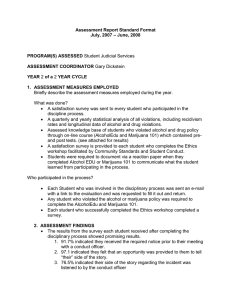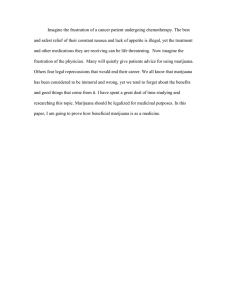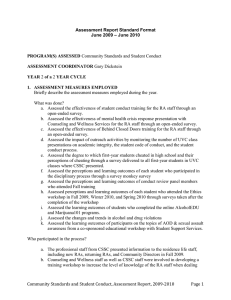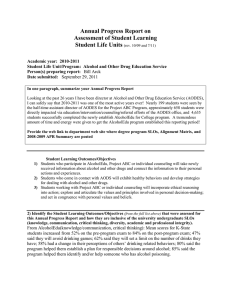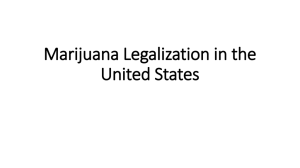Community Standards Student Conduct
advertisement
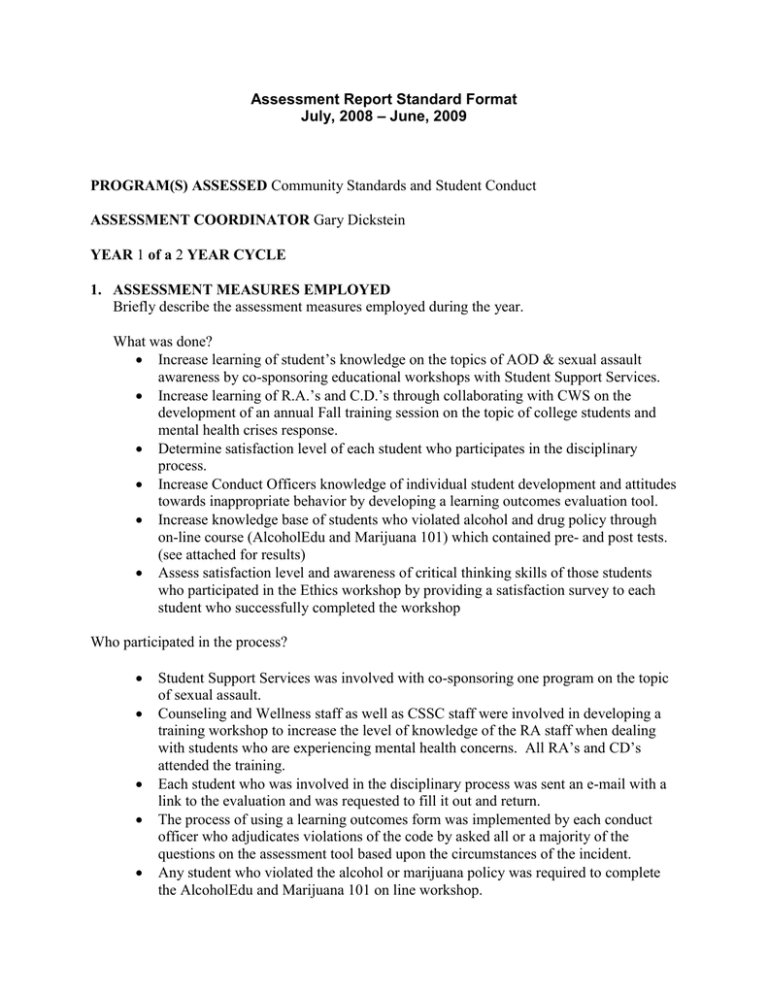
Assessment Report Standard Format July, 2008 – June, 2009 PROGRAM(S) ASSESSED Community Standards and Student Conduct ASSESSMENT COORDINATOR Gary Dickstein YEAR 1 of a 2 YEAR CYCLE 1. ASSESSMENT MEASURES EMPLOYED Briefly describe the assessment measures employed during the year. What was done? Increase learning of student’s knowledge on the topics of AOD & sexual assault awareness by co-sponsoring educational workshops with Student Support Services. Increase learning of R.A.’s and C.D.’s through collaborating with CWS on the development of an annual Fall training session on the topic of college students and mental health crises response. Determine satisfaction level of each student who participates in the disciplinary process. Increase Conduct Officers knowledge of individual student development and attitudes towards inappropriate behavior by developing a learning outcomes evaluation tool. Increase knowledge base of students who violated alcohol and drug policy through on-line course (AlcoholEdu and Marijuana 101) which contained pre- and post tests. (see attached for results) Assess satisfaction level and awareness of critical thinking skills of those students who participated in the Ethics workshop by providing a satisfaction survey to each student who successfully completed the workshop Who participated in the process? Student Support Services was involved with co-sponsoring one program on the topic of sexual assault. Counseling and Wellness staff as well as CSSC staff were involved in developing a training workshop to increase the level of knowledge of the RA staff when dealing with students who are experiencing mental health concerns. All RA’s and CD’s attended the training. Each student who was involved in the disciplinary process was sent an e-mail with a link to the evaluation and was requested to fill it out and return. The process of using a learning outcomes form was implemented by each conduct officer who adjudicates violations of the code by asked all or a majority of the questions on the assessment tool based upon the circumstances of the incident. Any student who violated the alcohol or marijuana policy was required to complete the AlcoholEdu and Marijuana 101 on line workshop. Each student who successfully completed the Ethics workshop completed a satisfaction survey. 2. ASSESSMENT FINDINGS Sexual Assault Program A program with Student Support Services on Men Stopping Rape was completed on the topic of sexual assault awareness. Approximately 100 students attended. No formal evaluation of the program was given to participants, however, the comments from the participants was very positive. An alcohol education program was not co-sponsored by CSSC this year. Mental Health Training A half day training session on student suicide and mental health crisis’s was developed and presented with Counseling and Wellness where all ORS paraprofessional and Hall Director staff attended (approximately 85 people) A survey was provided to each participant. The results provided us with feedback that was generally positive and showed that the participants learned information about the topic they did not know before. The feedback also indicated that changes to the program for the following year should include modifying the delivery method of the information and the length of the program. Conduct Process Satisfaction Survey The results from the survey each student received after completing the disciplinary process showed promising results. 1. 91.3% indicated they received the required notice prior to their meeting with a conduct officer. 2. 69% responded that the on-line version of the Code was easy to access. 3. 100% indicated they felt that an opportunity was provided to them to tell “their” side of the story.95.5% indicated their side of the story regarding the incident was listened to by the conduct officer. 4. 62.5 % indicated they believed the sanction(s) they received as a result of their conduct conference were appropriate. 5. 71% indicated they believed the incident and consequences caused them to think more about how my behavior affected themselves or others. 6. 87.5% indicated the incident and its consequences have caused me to think more about how my behavior has affected me. 7. 100% indicated they believed as a result of the incident and consequences that they would be less likely to repeat the behavior in the future. Interview/Observation Check List We have implemented the process of using a learning outcomes form and ask each student during the conduct conference process the questions on the form. Alcohol EDU Workshop In total, 137 Wright State University students participated in AlcoholEdu for Sanctions (i.e. completed Survey 1 or the Pre-Test, at minimum). Seventy-four percent (74%) of the students who participated in the AlcoholEdu surveys (ages 18 and over) completed the entire course, including all three surveys. Data from the Alcohol EDU survey indicates the following: Wright State University students reported an increase in their expressions of social concern through care-taking behaviors. Overall, Wright State University students reported an increase in the use of protective factors after completing the course. Most notably, the percentage of students who reported they think about their BAC while drinking substantially increased from 40% to 66%. 90% of the students reported that AlcoholEdu prepared them to help in situations where they have identified an alcohol overdose. 89% of the students considered that AlcoholEdu prepared them to express concern to someone about their alcohol use. 87% of the students reported they paid attention to the course. 77% would recommend AlcoholEdu to other people. Marijuana 101 In total, 28 students took the course and successfully completed all parts. The survey results indicated a 30% increase in average test scores between pre-Test and Post Test demonstrating an enhanced knowledge about marijuana and issues accompanying its use. The respondents reported that there was a positive change in their opinions about the adverse effects of regular marijuana usage after taking the workshop. Ethics Survey The findings from the ethics workshop evaluations were very positive. The majority of participants felt the workshop to be helpful and made them aware of the ethical dilemmas of their inappropriate behavior. The participants thought the workshop increased their ability to critically make decisions in the future to avoid further negative consequences. The participants also shared that the course could be lengthened to further expand on the principles and concepts addressed in the sessions. 3. List the LEARNING OUTCOMES of the program. Each student who is required to complete the Alcohol Edu. or Marijuana 101 class will achieve a passing score of at least 80% on the required post test to insure retention of knowledge contained in the workshop chapters. Each student who completed the AlcoholEdu program and Marijuana 101 class will have an increased level of knowledge regarding any future use of both drugs. Each Conduct Officer was assisted in determining appropriate sanctions for each violation the student was found responsible through obtaining information from the questions asked as well as additional insight into if the student was taking responsibility for his/her actions and to what degree they understood why their behavior was of concern Each student who completes the Ethics workshop will have a better understanding of the ethical repercussions of the decisions they make. 3. PROGRAM IMPROVEMENTS Collaborate with Student Support Services in order to continue to provide educational programming for students. Utilize evaluation information to reformat presentation for RA’s on mental health. Alter some of the questions in the conduct satisfaction survey to obtain more detailed information from the participants. Increase the number of sessions from 4 to 6 for each Ethics seminar offered. 4. ASSESSMENT PLAN COMPLIANCE Explain deviations from the plan (if any). None 5. NEW ASSESSMENT DEVELOPMENTS Implementation of a new data-base will be able to produce additional, as well as more accurate, statistical reports to assess who is violating the code, how they are violating it, as well as how many times and the location of the violation.
